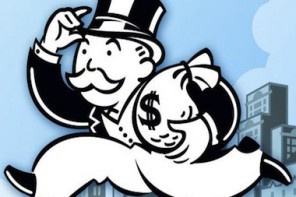Though not necessary… Part 1 & Part 2
The major news stories earlier this week were three, or four, depending on how you count them. The US House of Representatives voted down the amended proposal that had come to them from this White House and its Federal Reserve partners, requesting loans amounting to 700 billion dollars for a bail-out of our free-falling credit markets. The subtext of story number one, which will likely become story number two in the next day or so, is the partisan sniping that has already consumed the issue. A conservative core of House Republicans now claim, with a semi-straight face, that a partisan floor speech from House Speaker Nancy Pelosi actually turned them against a bill they came prepared to vote for. The speech “was” partisan—in the extreme, and far too much so for my taste. But the difficulty with such a story is that the proposal coming from a Republican administration garnered far more support from House Democrats than House Republicans. And while John Boehner may wish to argue that a shift in the Republican mood ring caused the failure, the fact is, this proposal never had the votes to pass—from the Republican side. There is no love lost between this president and the Grand Old Party he has ruined. Moreover, no one wants to return home to campaign after voting for this theatrically unpopular rescue measure.
The second story is the Dow Jones plummet of 777 points in a single day. This may well be the thing that gives the Congress the inspiration it needs to pass the measure, as they seem likely to do later this week. It is a staggering slide, with “real world implications.”
For this is not a stock market crisis, and thus it is not Depression #2; what it is, is a credit crisis of staggering proportions. But that crisis is real, and it bleeds into the stock market and the real-world effect is the stunning devaluation of retirement accounts, which means a catastrophic loss for anyone unfortunate enough to be retiring this year. Or next.
The third story is the congressional report concerning investigations of the alleged partisan firing of nine US attorneys at the directive of former US Attorney General, Alberto Gonzalez. That is a story with legs as long as the current fiscal crisis and, I would argue, for similar reasons.
It all boils down to faith, as I suggested at the tail end of my previous column. If capitalism is a system that hinges on the future, then it is also a system that hinges on faith. The reason words like ‘fidelity’ and ‘trust’ and ‘credit’ (as in credere) loom so large in bank names is that the global system of capital is based on lending, and lending is based on trust. The real crisis in the current system is that no one, literally no one, trusts anyone anymore.
Well-meaning citizens seeking loans to buy cars and houses and such no longer trust the people lending them money to tell them the truth about the conditions under which they are borrowing that money. Too many people have lost everything because the conditions of their original loan changed under their very feet.
And now the crisis in trust has shifted gears, moving to the financial sector. So many bad loans have resulted in so many failures and foreclosures that banks themselves are hesitant to loan anyone money—even each other. If no one is being honest about the state of their financial health, and if everyone is overextended, then how do we know to whom we can lend (or turn) with confidence?
I would add a further wrinkle to the current crisis; it is a cultural wrinkle with a religious edge.
The language of faith has been so debased in the current economy, that it no longer seems worthy of credit. Faith has been invoked too many times, too casually, and in relation to too many things. And along the way, faith has been privatized—just the way evangelicals understand it. The current president, and his allegedly Palin-fueled base, have a lot to do with that.
For theirs is an utterly “individualist“ understanding of the language faith. Faith is what gets you (singular) right with your Maker (singular), what gets you (singular) into heaven (singular), what makes you (singular) secure about eternal life (singular, future tense). It has little to do with being believed. Or believable. And the ugly secret lying at the heart of the capitalist enterprise is that, for all its rhetoric of ferocious competition and punishing failure, capitalism hinges on faith, on trusting the word of those with whom you deal. If they borrow, they will repay. If you lend, you will deliver what you promise. Oversight and regulation are required simply to ensure that both parties to any capitalist bargain keep their word. But no such oversight entity can inspire faith. And faith—conceived as “public,“ not private trust—is what dropped off the radar a week ago.
This administration cannot restore it. Their Attorney General, the highest officer defending the rule of law in the land, was not only a patsy for this administration, he was a reckless rule-breaker who flirted shamelessly with the very edge of legality. These men to restore confidence—to say it again, “public“ trust—to a failing system.
In a long-forgotten story that never got the attention it deserved, former Democratic Majority Leader, Tom Daschle, related the following exchange during his first meeting with then President-elect, George W. Bush No sooner had he been seated than Bush told him that he “hoped [Daschle] would never lie to him.” Blindsided and perplexed, Daschle responded lamely by saying that he hoped the President would never lie to him, either. The point of that exchange is that lying was already on this President’s mind, even before he took office. It is on everyone’s mind now.
The proposed special prosecutor who will soon be appointed to look into the Gonzalez firings will doubtless gather ample evidence to show us yet again how many shameless liars work for this administration. They are many of the same people who have demonstrated no concern for the future or the long term, and no sense that they understand the reality or the enormity of the numbers they throw around with such casual abandon.
Such leaders cannot, simply cannot, save us. They cannot restore the public trust, which is the only sure way to a slower (but surer) recovery. And such a recovery will be slow. Undoing this kind of damage requires a slow-fix, not a fast one, and will take a great deal of time. It is an inelegant and unhappy burden for the next President to bear. But it is ours, and we must faithfully exercise our duties in serving it.
That “forgiveness“—of massive debts and of corporate malfeasance—must be part of such a solution is an especially bitter pill to swallow.




